May 26, 2025 | 19:37 GMT +7
May 26, 2025 | 19:37 GMT +7
Hotline: 0913.378.918
May 26, 2025 | 19:37 GMT +7
Hotline: 0913.378.918
Despite the stormy and rainy weather, Mr. Le Minh Chinh's white leg shrimp farming facility in Ninh Phu commune, Ninh Hoa town (Khanh Hoa), is still busy stocking seeds. The pond is maintained with a continual operation of a paddlewheel aerator to minimize water stratification, which results in oxygen deficiency and the death of farmed shrimp.
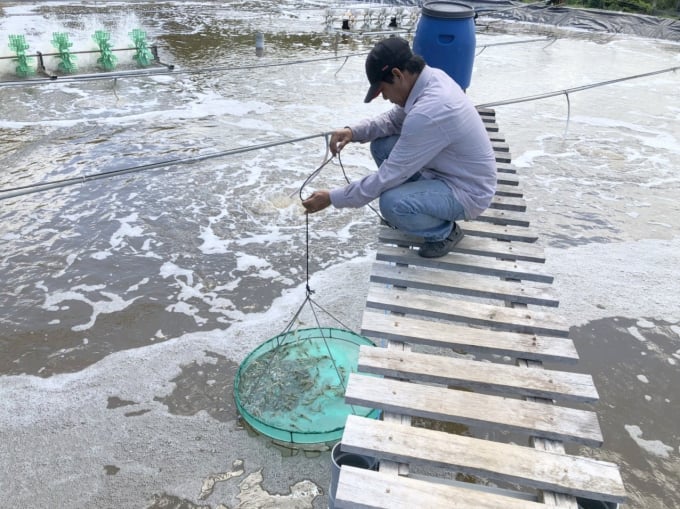
The lobster consumption market generally spikes towards the end of the year. Photo: KS.
Consumption of shrimp products was restricted as a result of the Covid-19 pandemic's effects. Shrimp prices have even fallen precipitously, sometimes to as low as VND 78,000 per kg (type 100 heads per kilogram), leaving farmers with little profit, if not a loss. However, after September 30, the disease condition in the province progressively improved, social distancing was eased, and the domestic shrimp consumption market became limited, resulting in a rise in the price of shrimp.
As a result, farming was temporarily stopped from Quang Nam province to the north in preparation for winter, with Quang Ngai and Binh Dinh becoming the primary regions for shrimp stocking. However, the central region has a small number of ponds, with the majority being earthen ponds.
Mr. Pham Thanh Sinh, Chairman of the Ninh Phu Commune People's Committee, said that the commune currently has around 20 hectares of shrimp ponds covered with canvas for crop 3, an increase of more than ten hectares over the previous year. The majority of farmers have just stocked and are anticipating harvesting at the end of the year and over the New Year break.
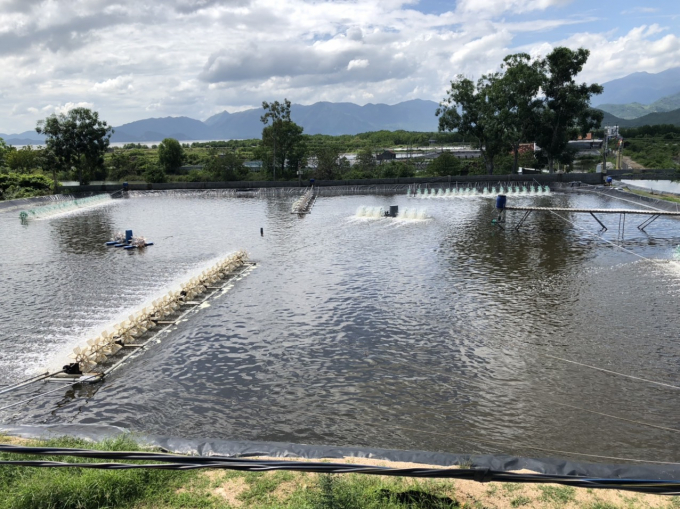
Shrimp farmers expect that the selling price would increase at the end of the year. Photo: LK
Similarly, many farmers are stockpiling seeds in high-tide white leg shrimp farming sites in Van Tho and Van Hung communes... Van Ninh district with the expectation of earning a higher revenue at the end of the year.
According to the Khanh Hoa Fisheries Sub-Department, the province's overall agricultural area is more than 3,436 hectares (of which more than 2,898 hectares are dedicated to salt and brackish farming), accounting for 96 percent of the plan's total production of more than 14,746 tons (reaching 92 percent ).
About 119 hectares of black tiger shrimp are being farmed in October, while 671 hectares of white-leg shrimp are being farmed, of which 140 hectares are being farmed for production and feeding the market from now until the end of the year.
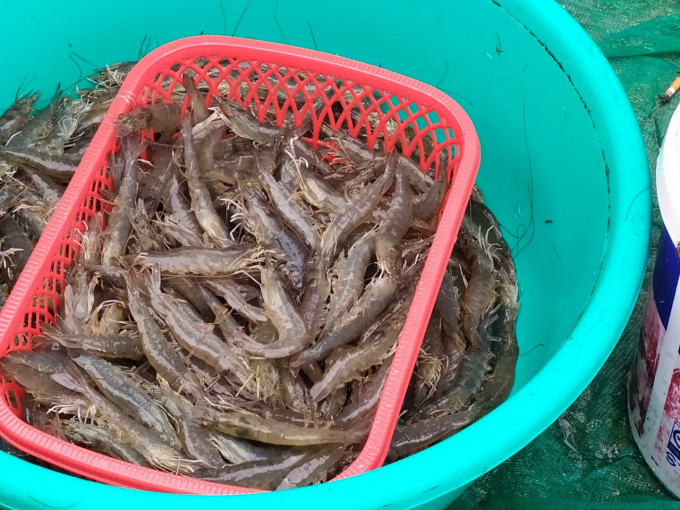
The price of white-leg shrimp has begun to increase sharply to VND 95,000 per kg. Photo: KS.
Mr. Vo Khac En, Deputy Director of Khanh Hoa Fisheries Sub-Department, said that the third harvest was a supplemental crop owing to the wet and stormy season, although many brackish water farmers in Khanh Hoa stocked to take advantage of year-end shrimp pricing.
However, the Sub-Department advises that farmers stock this crop at a reasonable density, not too dense since the rainy season has the potential to drastically alter the environment, causing harm to farmed shrimp.
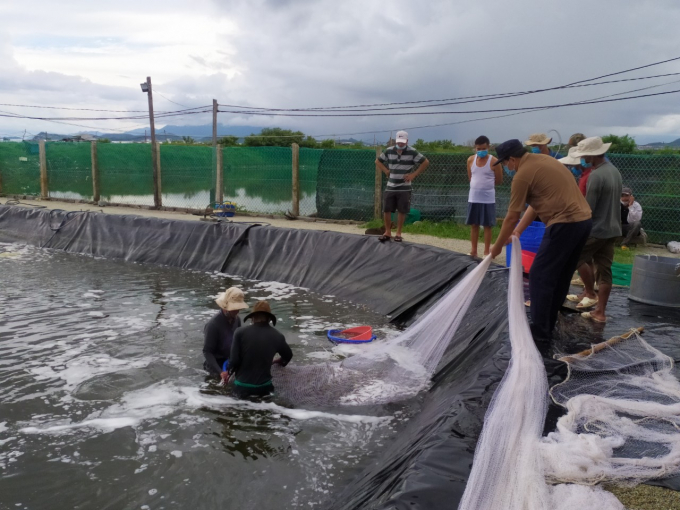
White-leg shrimp farmers are harvesting. Photo: KS.
As a result, growers must constantly update, analyze, and predict meteorological information in order to be proactive in shrimp farming. When heavy rain comes, individuals must take steps in advance, such as balancing the pH of the pond, distributing lime around the pond, and boosting oxygen fans to prevent stratified water from creating a localized shortage of oxygen for farmed shrimp.
"Farmers must learn these technical requirements and practice them often in order to be successful," Mr. En said.
Farmers of lobsters expect a positive scenario
According to a leader of Cam Binh commune, the situation of lobster consumption in the area has improved somewhat since the end of social distancing; traders are purchasing more frequently, and the price of blue lobsters for sale ranges between VND 700 and 900 thousand per kg, while lobster costs between VND 1.4 million and 1.6 million per kg.
According to this commune leader, the lobster consumption market generally spikes towards the end of the year, particularly around the New Year and Lunar New Year, facilitating the sale of lobsters. To ensure an adequate supply of lobsters for sale during the occasions, green lobsters are often stored in March and April of the lunar calendar, whereas cotton lobsters are kept six to eight months in advance.
It is well known that lobster producers no longer spend in one-time stocking but rather divide them into many batches throughout the year (3 months or 4 months of stocking one batch). Thus, producers will sell shrimp for meat three to four times every year, according to the cycle. Additionally, farmers are optimistic about the shrimp harvest at the end of the year since they often sell at a profit.
Translated by Linh Linh
![Advanced mariculture – an inevitable trend: [4] Accompanied by scientists](https://t.ex-cdn.com/nongnghiepmoitruong.vn/608w/files/sohk/2025/05/13/1941-pgsts-vo-van-nha-140958_717.jpg)
(VAN) According to Assoc. Prof. Dr. Vo Van Nha, Director of the RIA III, the development of advanced offshore mariculture is no longer an option but an essential path for Vietnam’s fisheries sector.

(VAN) Vietnam is intensifying the development of mollusk farming areas that meet international standards, aiming for sustainable growth and enhancing its export position in the global seafood market.
![Advanced mariculture – an inevitable trend: [3] Policy-driven momentum](https://t.ex-cdn.com/nongnghiepmoitruong.vn/608w/files/doanhtq/2025/05/21/0104-0616-0348-nuoi-bien-170339_789.jpg)
(VAN) To ensure the success of offshore mariculture that uses advanced technologies, it is essential to establish supportive policies that inspire both individuals and enterprises to invest with confidence.
![Advanced mariculture – an inevitable trend: [2] Outstanding results](https://t.ex-cdn.com/nongnghiepmoitruong.vn/608w/files/sohk/2025/05/12/4632-4136-nuoi-bien-11-164117_819.jpg)
(VAN) Pilot models of high-tech offshore mariculture in Vietnam, particularly in the South Central Coast region, have demonstrated exceptional economic returns and sustainability, setting a new direction for the country’s aquaculture industry.
![Advanced mariculture – an inevitable trend: [1] Moving offshore](https://t.ex-cdn.com/nongnghiepmoitruong.vn/608w/files/phucpm/2025/05/18/0252-2436-nuoi-bien-6-162148_783.jpg)
(VAN) Mariculture using advanced technology and moving offshore is an inevitable trend, as nearshore areas increasingly reveal limitations.
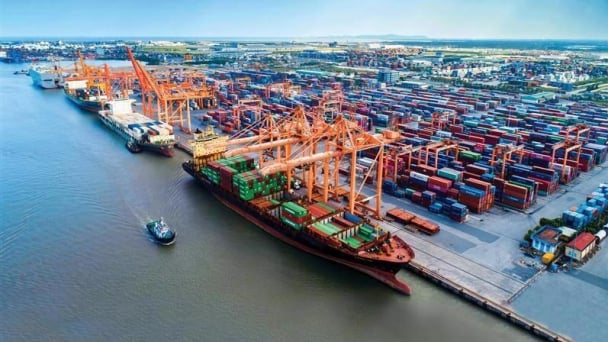
(VAN) South Korea is currently the second-largest investor in Hai Phong in terms of the number of projects (186 projects) and the largest in terms of total registered investment capital, reaching USD 14.2 billion.
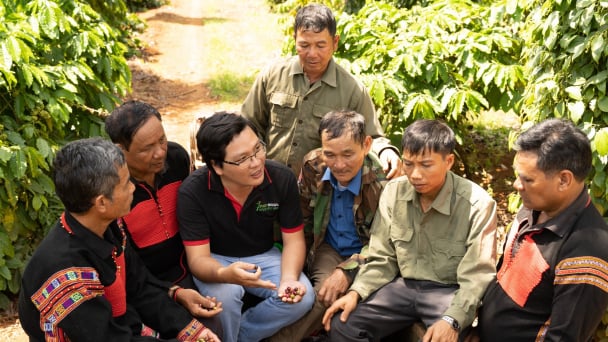
(VAN) As consumers become more environmentally conscious, legal regulations grow increasingly stringent...